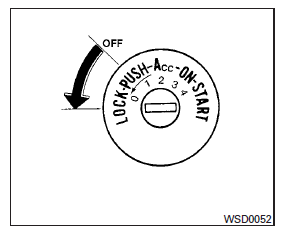Nissan Versa (N17): Ignition switch (if so equipped)
WARNING
Never remove the ignition key or place the ignition switch in the LOCK position while driving. The steering wheel will lock. This may cause the driver to lose control of the vehicle and could result in serious vehicle damage or personal injury.
Continuously Variable Transmission (CVT) (if so equipped)

The ignition lock is designed so that the ignition switch cannot be turned to the LOCK position until the shift lever is moved to the P (Park) position.
- When placing the ignition switch in the LOCK position, make sure that the shift lever is in the P (Park) position.
- When removing the key from the ignition switch (if it is inserted), make sure that the shift lever is in the P (Park) position.
When the ignition switch cannot be placed to the LOCK position:
1. Shift the shift lever to the P (Park) position.
2. Move the ignition switch slightly in the ON direction.
3. Turn the ignition switch to the LOCK position.
4. Remove the key if it is inserted in the ignition switch.
If the ignition switch is placed to the LOCK position, the shift lever cannot be moved from the P (Park) position.
The shift lever can be moved if the ignition switch is in the ON position and the foot brake pedal is depressed.
There is an OFF position 1 between the LOCK and ACC positions. The OFF position is indicated by a "1" on the key cylinder.
Automatic transmission (if so equipped)

The ignition lock is designed so the key cannot be turned to the LOCK position and removed until the shift lever is placed in the P (Park) position.
When removing the key from the ignition switch, make sure the shift lever is in the P (Park) position.
If the shift lever is not returned to the P (Park) position, the ignition switch cannot be moved to the LOCK position.
To remove the key from the ignition switch: 1. Shift the shift lever to the P (Park) position with the ignition switch in the ON position.
2. Place the ignition switch in the LOCK position.
3. Remove the key from the ignition switch.
If the shift lever is shifted to the P (Park) position after the ignition switch is turned to the OFF position or when the ignition switch cannot be turned to the LOCK position, proceed as follows to remove the key: 1. Move the shift lever into the P (Park) position.
2. Turn the ignition switch slightly toward the ON position.
3. Turn the ignition switch to the LOCK position.
4. Remove the key.
The shift lever is designed so it cannot be moved out of P (Park) and into any of the other gear positions if the ignition switch is turned to the OFF position 1 or if the key is removed from the switch.
The shift lever can be moved if the ignition switch is in the ON position and the foot brake pedal is depressed.
There is an OFF position 1 between the LOCK and ACC positions. The OFF position is indicated by a "1" on the key cylinder.
Manual transmission (if so equipped)

The ignition switch includes a device that helps prevent accidental removal of the key while driving.
The key can only be removed when the ignition switch is in the LOCK position.
In order for the steering wheel to be locked, it must be turned about 1/8 of a turn clockwise from the straight up position.
To lock the steering wheel, place the ignition switch in the LOCK position. Remove the key. To unlock the steering wheel, insert the key and turn it gently while rotating the steering wheel slightly right and left.
Ignition switch positions
LOCK: Normal parking position (0)
OFF: (1)
The engine can be turned off without locking the steering wheel.
ACC: (Accessories) (2)
This position activates electrical accessories such as the radio when the engine is not running.
ON: Normal operating position (3)
This position turns on the ignition system and the electrical accessories.
START: (4)
This position starts the engine. As soon as the engine has started, release the key. It automatically returns to the ON position.
 Precautions when starting and driving
Precautions when starting and driving
WARNING Do not leave children or adults who would normally require the assistance of others alone in your vehicle. Pets should also not be left alone. They could accidentally injure themse ...
Push-button ignition switch (if so equipped)
WARNING Do not operate the push-button ignition switch while driving the vehicle except in an emergency. (The engine will stop when the ignition switch is pushed 3 consecutive times in quick ...
Other materials:
Break-in schedule
CAUTION
During the first 1,200 miles (2,000 km),
follow these recommendations to obtain
maximum engine performance and ensure
the future reliability and economy of your
new vehicle. Failure to follow these recommendations
may result in shortened
engine life and reduced engine
performance.
...
If your vehicle overheats
If your vehicle is overheating (indicated by an
extremely high temperature gauge reading (if so
equipped), a red high temperature warning light
(if so equipped) ), or if you feel a
lack of
engine power, detect abnormal noise, etc. take
the following steps.
WARNING
Do not continue to driv ...
Categories
- Manuals Home
- Nissan Versa Owners Manual
- Nissan Versa Service Manual
- Video Guides
- Questions & Answers
- External Resources
- Latest Updates
- Most Popular
- Sitemap
- Search the site
- Privacy Policy
- Contact Us
0.009
